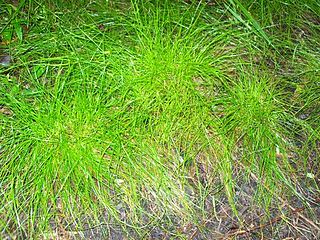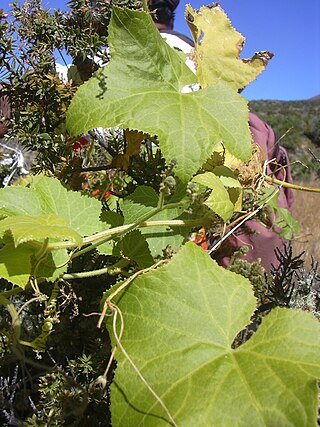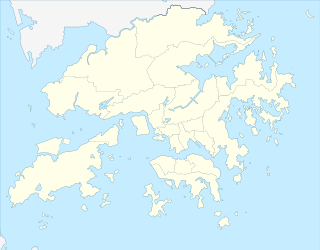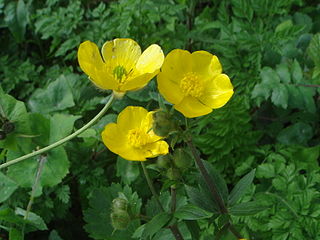
Cercocarpus, commonly known as mountain mahogany, is a small genus of at least nine species of nitrogen-fixing flowering plants in the rose family, Rosaceae. They are native to the western United States and northern Mexico, where they grow in chaparral and semidesert habitats and climates, often at high altitudes. Several are found in the California chaparral and woodlands ecoregion.

Podocarpus is a genus of conifers, the most numerous and widely distributed of the podocarp family, the Podocarpaceae. The name comes from Greek πούς + καρπός. Podocarpus species are evergreen shrubs or trees, usually from 1 to 25 m tall, known to reach 40 m (130 ft) at times. The cones have two to five fused cone scales, which form a fleshy, berry-like, brightly coloured receptacle at maturity. The fleshy cones attract birds, which then eat the cones and disperse the seeds in their droppings. About 97 to 107 species are placed in the genus depending on the circumscription of the species.

Podocarpus macrophyllus is a conifer in the genus Podocarpus, family Podocarpaceae. It is the northernmost species of the genus, native to southern Japan and southern and eastern China. Common names in English include yew plum pine, Buddhist pine, fern pine and Japanese yew. Kusamaki (クサマキ) and inumaki (犬槇) are Japanese names for this tree. In China, it is known as luóhàn sōng (羅漢松), which literally means "arhat pine".

Cyperus is a large genus of about 700 species of sedges, distributed throughout all continents in both tropical and temperate regions.

Cyperus rotundus is a species of sedge (Cyperaceae) native to Africa, southern and central Europe, and southern Asia. The word cyperus derives from the Greek κύπερος, kyperos, and rotundus is from Latin, meaning "round". The earliest attested form of the word cyperus is the Mycenaean Greek 𐀓𐀞𐀫, ku-pa-ro, written in Linear B syllabic script.
Gonystylus macrophyllus is a species of plant in the family Thymelaeaceae. It is native to Indonesia, Malaysia, the Nicobar Islands, Papua New Guinea, East Timor, the Solomon Islands, and possibly the Philippines.

Melicytus is a genus of flowering plants in the family Violaceae. Hymenanthera is a synonym.

Cyperus eragrostis is a species of sedge known by several common names, including tall flatsedge, nutgrass, tall nutgrass, umbrella sedge, chufa, Earth almond, zula nuts, edible galingale and pale galingale.

Cyperus difformis is a species of sedge known by several common names, including variable flatsedge, smallflower umbrella-sedge and rice sedge. This plant is native to southern Europe, most of Africa and Asia, and Australia, and it is naturalized in other areas of the world, including large parts of the Americas.

Cyperus odoratus is a species of sedge known by the common names fragrant flatsedge and rusty flatsedge. This species is quite variable and may in fact be more than one species included under one name.

Cyperus laevigatus is a species of sedge known by the common name smooth flatsedge.

Cyperus gracilis, with the common name is slender flat sedge and slimjim flatsedge, is a sedge native to Australia. The species epithet gracilis refers to the graceful form of the leaves.

Cyperus trachysanthos is a rare species of sedge known by the common names pu`uka`a and sticky flatsedge. It is endemic to Hawaii, where it is known from Kauai and Oahu. It was known from Niihau, Molokai and Lanai, but it has been extirpated from these islands. It is a federally listed endangered species of the United States.

Cyperus pennatiformis is a rare species of sedge known by the common name coastal flatsedge. It is endemic to Hawaii, where it grows on the islands of Maui, Kauai, and Laysan. It is a federally listed endangered species of the United States.
Cyperus laxus is a sedge species in the Cyperaceae. It is native to tropical regions of the Western Hemisphere and also to Africa. The species is reportedly naturalized in Assam and the Andaman and Nicobar Islands.

Sicyos macrophyllus is a rare species of flowering plant in the Cucurbitaceae, the squash family. It is endemic to Hawaii where it is present only on the island of Hawaii. It has likely been extirpated from the island of Maui. Common names include alpine bur cucumber, largeleaf bur-cucumber, and 'anunu.

Cyperus javanicus, also known as the Javanese flatsedge, is a sedge of the family Cyperaceae that is native to Indonesia and Australia.

Beaufort Island is a member of the Po Toi group of islands in Hong Kong. Its size is about 120 ha while its highest point is 270 m (890 ft) above sea level.

Ranunculus macrophyllus is a species of plants in the family Ranunculaceae.

















